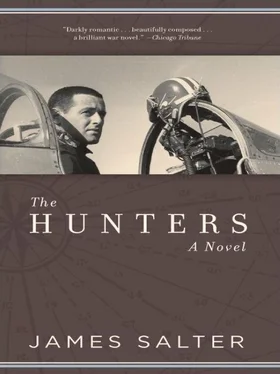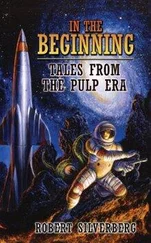“You and the colonel, eh?”
“It was from a distance, but I tell you I saw him.”
The word had spread through the group like a stain. Everybody was looking for Casey Jones, secretly, guarding their motives. Whether they sought to fight or avoid him, they were full of restless expectation. He was being seen everywhere, sometimes simultaneously.
The briefing began. Cleve listened mechanically. Only the weather seemed to make an impression on him. It was forecast to be fair all through the area with visibility unrestricted. The sun would be high during the period they were north. The weather officer gave its azimuth and elevation in degrees. Cleve felt like a patient listening to a description of an operation he was going to undergo.
Imil stepped onto the stage.
“They’ll be up this time,” he said, “so watch out. Don’t take any chances, especially with that striped one. He may look alone, but he never is, and if you want to get back, keep your eyes open. Look high. That’s where the ones you don’t see until it’s too late come from. That’s it. Remember you’re fighter pilots. Let’s fight!”
After the briefing, Cleve lay down on one of the benches in the locker room and tried to sleep a little. There was more than an hour before start-engines time, and he was still tired. It was difficult to even doze, however. The hard bench denied any comfortable position. Sluggish flies buzzed about and found any bare skin. He was constantly brushing them off his hands, face, and ankles. He spent half an hour that way, dropping off to sleep sometimes but never relaxing. At the end he felt irritable and less rested.
He stood up and started to dress slowly. The room was filling up. There was talking and slamming of locker doors. Pell was assuring Hunter that the MIGs would be up this time, too.
“We’ll catch them crossing at the reservoir,” he said. “That’s where they’ve been coming over.”
He turned to Cleve.
“We ought to stay close to the reservoir,” he advised, “and high.”
“I’ll decide where we go.”
“Only trying to help you out,” Pell smiled.
“When I need help, I’ll ask for it.”
Pell shrugged.
“If you don’t want to be where the MIGs are…” he began.
“We’ll be where they are.”
“We’d better stay close to the reservoir, then.”
“Oh, shut up, Pell,” DeLeo said. “You don’t know as much about it as you think.”
“How many MIGs have you got?” Pell asked.
DeLeo reddened. “Don’t brag on your luck,” he said angrily. “Luck? There’s no luck involved.”
“Don’t talk so much, Pell,” Cleve interrupted.
“Say, what’s going on here anyway? What’s the problem?”
“You’re boring everybody.”
“Too bad. We’ll see who gets the MIGs, eh?”
The room had grown quiet. Everybody was listening. It was a moment Cleve and even all of them had been expecting.
“That’s right, Pell,” he said. “We’ll see.”
He turned and continued putting on his equipment. It seemed unusually heavy and restrictive. The dinghy felt like a loaded suitcase. He picked it up, then his parachute, and walked out toward his ship. His feet scuffed at the ground. He inspected his airplane. As he moved around it, he looked up several times at the sky. The first fair-weather cumulus was there, like spring flowers showing in the fields. He felt as if under the influence of a strong stimulant. He wanted to move his hands, to let his body take the tempo, absorb the energy that was inside him. Even after he had climbed into the cockpit and strapped himself down, he sat uncomfortably, thinking of what had been said, honing himself. His fingers ran blindly over the switches. His feet tapped the rudder pedals.
On takeoff, he noticed for the first time that the rice paddies surrounding Kimpo were turning green. He watched the ground flowing beneath him. There was one small farm that had three tall poplars in front of the house, giving it shade. They swept across it. Now, in motion, he felt somewhat better. They picked up speed and began to climb. He was aware of an elusive, mystic sensation supporting the physical as they went up.
It was a beautiful day. The coarse, brown peninsula looked peaceful. The snow had vanished from the mountains, and the rivers were free of ice. The sea was like an immense piece of jade through his sunglasses. Along the many crestlines were veins that gleamed like silver when the sun hit them. Thick green crowns were beginning to appear, and even the clay and sand seemed brighter. Low, scattered puffs of clouds looked like foam flecks on an even surf.
Just past Sinanju, there was a call: dust was rising from the runway at Antung. A rush of uneasiness came over him. His forearms and shoulders felt loose. There was a high, inaudible tone in the air, the thin skewer of fear. Every sensation was as if it had never happened to him before. The sky seemed plagued with invisible dangers.
As he reached the Yalu near Antung, he heard a flight dropping tanks for six ships passing above them at thirty-six thousand feet. They were all heading down the river. He looked up toward the reservoir, but saw nothing. He started a turn in that direction.
“Two o’clock high, Black,” DeLeo called.
He had spotted them at the same instant, four of them out to the south at a higher altitude. He turned toward them to put them at twelve o’clock. They were headed in his direction. He could not identify them yet. He watched them intensely, as the slow seconds brought them together.
“They’re MIGs,” he heard Pell say.
Suddenly they were close, and there was no longer any doubt. Cleve felt an awesome disbelief as they passed above him, and he saw the detached-looking tails, like those on the celluloid birds that twirled at circuses.
“Drop tanks,” he said.
The empty containers fell away, leaving his ship light and fast. It was like kicking off a pair of shoes in the water. The turn to follow the MIGs as they passed had put DeLeo and Hunter closer to them than Cleve, but still not close enough it appeared. There would be a long, useless chase. Just as Cleve was assessing it, he suddenly saw two more MIGs off to his right that would be crossing overhead in a moment as evenly as if it were all happening at an intersection. He called them out and began turning immediately to come out parallel to or behind them. Too high, he thought quickly. They were just a little too high.
There was not much time to decide. He started pulling his nose up sharply to get a snap shot perhaps, as they went by above him. If he was lucky, he might damage one and slow it down. It was all an act of balance. He had his nose high enough, but his speed was falling off rapidly. He would be slow and vulnerable.
“Am I clear?”
No response. He glanced about. Nothing. At the last second he could hold that steep pitch, the trailing MIG moved into his gunsight. He squeezed. The tracers floated out. His heart burgeoned. Part of his burst was hitting near the tail. A thin line of smoke began to follow the MIG.
He dropped his nose. As it came down heavily, he completed his turn. He was not too far behind, about ten thousand feet, and two or three thousand feet below. He watched the MIG intently. Smoke was still coming from it, and then he saw that it was dropping behind the leader. He had crippled it. He could feel himself gaining, although he was unable to actually detect it yet. Then he heard Pell.
“I can’t keep up with you.”
“Keep me in sight,” Cleve ordered.
“You’re pulling away.”
“Goddamn it, stay with me!”
“I’ve got a hung tank. I can’t.”
Now he could see that he was closing the distance between himself and the MIG. He looked back quickly. Pell was falling behind, as far back as Cleve was from the MIG.
Читать дальше












